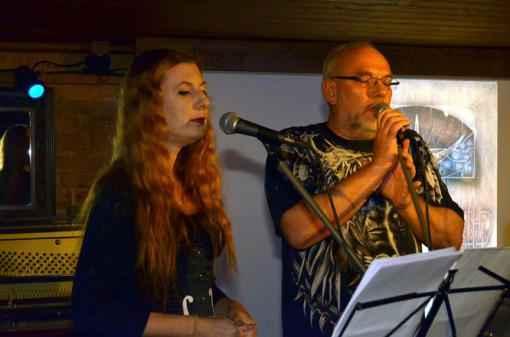Since the album Sme len hostia na zemi (We Are Only Guests on the Earth) (2009) Tomáš Kytnar and his group Tady To Máš has brought out a new album every two years. In a time when U2 completes a disc three years after the previous one and reviewers think it is too soon, this can seem like overproduction, but that is nothing compared to Neil Young, who even into his seventies is providing his fans with more than an album a year … However frequency is a relative term, in this case linked to the fact that Kytnar – once a rock pianist, and today more in the genre blues-chanson – still has something to express in music. Some years back he came under the spell of Slovak as a very musical language, and so his albums, even though created in Brno in the circles around the Stará Pekárna club and the Indies studio, contain Slovak poetry put to music. At the same time the new album directly follows on from the previous title Srdiečka tiché (Quiet Heart) and is dedicated solely to the verse of the Bratislava native and wonderful poet of the city Erika Ondrejičky (*1964). Kytnar has drawn on his poetry over the long term – alongside both single-theme albums his poetry also found a place on the preceding recordings Vôňa rána (Fragrant Morning) (2011) and Krátkovlasá čembalistka (Short-haired Harpsichordist) (2013).
The works of Tomáš Kytnar and his group have a particular continuity. Although they bring out albums relatively quickly after each other, I have the feeling that musically they are reflective and in the long term they change their habits. If I had for example with the album Krátkovlasá čembalistka the feeling that the author had arrived at very tight, truly compact shape, in Srdiečka tiché (2015) this feeling was even stronger and in Krajina diamantov (Diamond Country) it is the most convincing of all. It is true that on a 50-minute canvas understandably they alternate rhythmic and ballad-like passages, each song with a different arrangement, they emerge and depart with the voices of the guests. But the album comes across as a single suite, in which everything fits together, small moments repeat or refer to each other (Kytnar is a composer with a characteristic style, reflecting his move from rock to contemporary above-genre with a recognisable dose of blues). A hit, in the sense that some songs would stand out over the others and “sell” the album, is something you won’t find here. Which of course does not mean that the disc would be lacking more significant passages. For some such a “catchy moment” can be the guest appearance by Tomáš Kočko (by no means the first in the history of Tady To Máš) in Jarná pieseň (Spring Song). For the culmination will be the ballad-like Cinque stagioni della musa with its faint signs of blues and the excellent flute of Jan Kyncl. And if you pay attention to the very end, then you can find your diamond in the rhythmically interesting Váha rovnováhy (Value of Balance).
The form of a suite does not apply only to the album as a whole but also to individual songs. This is clear with the longest composition on the album Pred búrkou pri Búroch, the events of which are framed by the sound of storms and the mood of which is strengthened not only by the narration of the singer Tomáš Frgala, but also by Kyncl’s well-arranged flute and especially the changing role of Kytnar’s piano. Concerning the piano as an instrument, played by the band’s leader and the composer of the music, I don’t think it has fundamentally changed from one album to the next. Rather it has remained Tomáš’ known style, which involves passing the melodic role mainly to the wind instruments and male and female vocals, while the piano handles the harmonies and to a great extent also the rhythms. Only while in the case of some of the older recordings with his keyboards Kytnar almost supplemented the bass, in the group’s current incarnation he leaves sufficient space for the rhythms to Lukáš Kytnar (drums) + Mojmír Sabolovič (bass guitar). The guys are well-matched, recently working together in the increasingly successful group Band of Heysek, and their relatively hard but at the same time sensitive rhythms are a great fit for the album, especially in the faster passages.
Tomáš Kytnar has his own vision of the world, to which corresponds not only his preference for Slovak over Czech (and why not? Some swear by English lyrics, while for someone else the best language to put to music is that of Ondrejičky), but also to the structure of his compositions and the expansiveness of the arrangements. His music does not lack for a tinge of blues or rock energy, but it is not easily digested at first hearing. You have to immerse yourself in Krajina diamantov to discover the true value of all its jewels. Unfortunately the group makes things harder for new listeners in that some passages in the lyrics are hard to understand (sadly even in the fundamental Váha rovnováhy), but fortunately the graphically well-presented booklet contains the words of all the poems/songs. Some even with an English translation.
Tady To Máš: Váha rovnováhy; Released by Tomáš Kytnar 2017, 10 songs, total length 50:42
































No comment added yet..